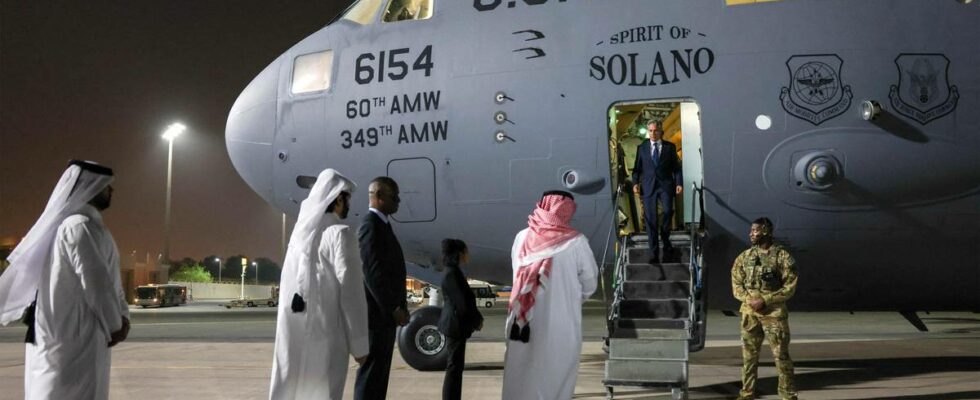Large parts of Gaza lie in ruins and over 40,000 Palestinians have so far been killed in the war. Over 100 Israeli and foreign hostages are still being held captive in Gaza. Many fear that a major war could break out in the region if Israel and Hamas fail to agree on an agreement soon. Palestinians forcibly evacuated from Khan Younis on August 21 due to new Israeli attacks. Photo: Mohammed Salem / Reuters The US Secretary of State has traveled around the Middle East like a whirlwind in recent days to try to convince the parties that they must lay down their weapons, release the hostages and start talking about the future of Gaza. Negotiators from the US, Egypt and Qatar have been trying for months to get Israel and Hamas to agree, but have not succeeded. Why not? Disagreement over duration The main reason why there will be no ceasefire is that Hamas wants it to be the start of the end of the war, and that the Israeli soldiers must leave Gaza. Israel, for its part, believes that the ceasefire should be temporary. They say the goal of crushing Hamas has not been achieved. Facts about the ceasefire proposal Phase 1: 42-day ceasefire. Hamas releases 33 Israeli hostages in exchange for Israel releasing Palestinian prisoners from Israeli prisons. Israel carries out a partial withdrawal from the Gaza Strip and allows free movement of Palestinians from southern to northern Gaza. Phase 2: New period of 42-day ceasefire. The vast majority of Israeli soldiers are withdrawn from the Gaza Strip. Hamas releases Israeli reservists and some soldiers held hostage in exchange for Israel releasing more Palestinian prisoners from Israeli prisons. Phase 3: Exchange of dead hostages and Palestinian prisoners. Implement the reconstruction plans overseen by Qatar, Egypt and the United States. Ending the complete blockade of the Gaza Strip. Disagreement over Israeli withdrawal Hamas has said it agrees with the original ceasefire proposal. But Israel has come up with additional demands. Namely, Netanyahu wants the Israeli army to continue to have control of the border corridor between the Gaza Strip and Egypt, the so-called Philadelphia Corridor. The reason for this is that he wants to prevent arms smuggling into Gaza from Egypt via tunnels. But neither is Egypt willing to accept a large Israeli military presence on the border between Egypt and Gaza. Egypt is an important player in the talks with both Israel and Hamas about the end game for the war. The Philadelphia Corridor. Photo: EMILIO MORENATTI / AP Netanyahu’s survival as prime minister More and more analysts in Israel believe that Prime Minister Benjamin Netanyahu is deliberately sabotaging the ceasefire negotiations. – The war favors him. It is the only thing that can keep him in power, says Israeli political scientist Uriel Abulof at the University of Tel Aviv to NTB. Netanyahu is also on a collision course with the Mossad intelligence service and the Israeli negotiating delegation. Israeli Prime Minister Benjamin Netanyahu depends on the support of Orthodox and nationalist parties to survive in Israeli politics. Photo: Maya Alleruzzo / AP They believe that the border between Gaza and Egypt can be controlled in other areas than by having soldiers there, says Middle East expert and senior researcher Jørgen Jensehaugen at the Institute for Peace Research (Prio). – This causes many in Israel to see Netanyahu’s new demands as an attempt to make the negotiations collapse, says Jensehaugen to news. Netanyahu’s political fate rests on the support of ultra-conservative and nationalist parties in Israel. They have made it clear that they will withdraw their support for Netanyahu if the war ends now. Blame each other But what about this week’s headlines that Israel has accepted an American compromise for a ceasefire? The US Secretary of State claimed earlier this week that Netanyahu agreed with the US draft agreement. But at home, the Israeli prime minister made it clear that he disagreed on several points. Senior researcher Jørgen Jensehaugen at the Institute for Peace Research (Prio). Photo: ISMAIL BURAK AKKAN / news – Netanyahu is doing this in order not to be blamed for the collapse of the negotiations, and to be able to throw the ball back to Hamas and blame them for there being no ceasefire, says Jensehaugen. The threat of major war Hamas is not an easy negotiating party. They are still holding over 100 hostages inside Gaza. Hamas also did not show up for the latest talks in Doha, Qatar. The danger of a major war in the Middle East also affects the ceasefire negotiations. Since Hamas leader Ismail Haniyeh was killed in Tehran, the world has been waiting for Iran to avenge Israel for the attack. But an Iranian attack on Israel has been long overdue. Iran says it will refrain from retaliating if there is a ceasefire in Gaza. – The threat from Iran is an incentive for Hamas not to accept the ceasefire. Their desire is to expand the front against Israel, says Jensehaugen. The plan is for talks on a ceasefire to continue in Egypt’s capital one of the next few days. Published 22.08.2024, at 22.28
ttn-69
The difficult road to a cease-fire in Gaza – news Urix – Foreign news and documentaries

